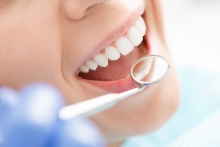A new study “Oral health and oral health care of Canadians” led by Prof. Paul Allison of McGill University’s Faculty of Dentistry, has received $3.3 million of funding from the Canadian Institutes of Health Research (CIHR) to support a collaboration with Statistics Canada’s existing Canadian Health Measures Survey (CHMS) to gather data and address oral health-related knowledge gaps. The study is a partnership involving all ten Canadian dental schools across the country.

Infected and inflamed gums may result in higher rates of complications and more fatal outcomes for individuals diagnosed with the SARS-COV-2 virus, according to a new international study led by McGill researchers recently published in the Journal of Clinical Periodontology. The study suggests that gum disease may be associated with higher risks of complications from COVID-19, including ICU admission and death.

If you have just had knee, shoulder or hip surgery, you may want to take anti-inflammatories in the morning or at noon, but not at night. A McGill-led study shows, for the first time, that circadian clock genes are involved in healing from surgery. Indeed, the researchers demonstrated that anti-inflammatory medications are most effective in promoting post-operative healing and recovery when taken during the active periods of our biological clocks.

Funding from the country’s three federal granting councils—the Canadian Institutes of Health Research, the Natural Sciences and Engineering Research Council, and the Social Sciences and Humanities Research Council— was awarded to Professor Maryam Tabrizian and a multidisciplinary team composed of Professors Reggie Hamdy, Monzur Murshed, Bettina Willie (Shriners Hospitals for Children) and Dr. Vahab Soleimani(Lady Davis Research Institute). With the $767,184 received over three years, the researchers will continue developing an innovative, non-invasive solution for bone regeneration.


Scientists have revealed the intricate process that bone cells use to repair themselves after mechanical injury, according to a study in the open-access journal eLife.
The research provides new insight on how the body adapts to all kinds of mechanical stresses – from pressure placed on bones during simple walking, to extreme forces experienced during intense exercise.

The discovery of a new biological pathway involved in pain processing offers hope of using existing cancer drugs to replace the use of opioids in chronic pain treatment, according to scientists at McGill University.
Because many therapeutic options, such as opioids, for patients with chronic pain carry the risk of addiction and undesirable side effects, this breakthrough offers promising lines of research into chronic pain treatment, says Luda Diatchenko, professor at McGill’s Faculty of Dentistry and co-lead author of the new study

Each year, about 500,000 North Americans get dental implants. If you are one of them, and are preparing to have an implant, it might be a good idea to start taking beta blockers, medication that controls high blood pressure, for a while. And to stop taking heartburn pills.
A body of research from McGill led-teams indicates that in order to raise the odds that dental implants will attach properly, there are clear benefits to taking certain common medications and avoiding others.
Bone cell growth, healing and death
